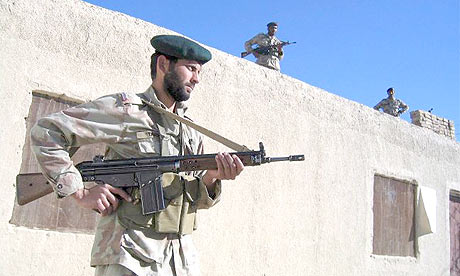Security officials say soldiers were trying to enter South Waziristan by helicopter

Pakistani soldiers near the Afghan border. Photograph: Matiullah Achakzai/EPA
Pakistani troops opened fire on US soldiers trying to enter the country’s lawless tribal area today, according to reports, marking a dangerous further deterioration in relations between the two anti-terror allies.
Details of the incident, in South Waziristan, are unclear. According to local security officials and tribesmen, however, two US helicopters breached Pakistani airspace in the early hours but were forced to retreat when they came under fire.
The US forces were likely to have been on a hit-and-withdraw mission against suspected militants in the area, similar to the first documented US ground raid into the tribal territory earlier this month, when choppers flew in commandos. That enraged the Pakistani army and public.
One security official in South Waziristan said: “American helicopters came, and there was a space [border] violation. Pakistani scouts [paramilitary troops]) fired artillery as a warning and they left. The helicopters did not land.”
Other reports said troops had directed gunfire at the helicopters, which were just inside Pakistani territory. One official said the fire had come from Pakistani soldiers based at a border checkpoint known as BP-27.
The Pakistani army admitted a skirmish had taken place, but it denied that its soldiers had been involved. “The villagers had some firing incident,” said Major General Athar Abbas, a Pakistani army spokesman. “But who fired at who, I cannot confirm.”
The US military denied that there had been any operation.
The US raid earlier this month, which killed up to 20 people, including civilians, was finally admitted by the Pentagon – though not on the record. “We did not have any forces or helicopters on or near the border,” said Mark Swart, a spokesman for the US military at Bagram airbase, in Afghanistan. “I don’t know where the reports are coming from.”
The US believes the tribal area is being used as a safe haven by Taliban and al-Qaida militants fighting US and coalition forces in Afghanistan.
Last week, the US military chief Admiral Mike Mullen said a new strategy that incorporated the tribal territory was needed for Afghanistan. Meanwhile, the US president, George Bush, is believed to have signed a secret order allowing US soldiers to stage operations in the tribal area even though the UN mandate for international forces in Afghanistan does not extend into Pakistan.
The Bush administration is thought to be in a desperate push for results in Afghanistan and a trophy strike against al-Qaida’s top leadership, which is likely to be based in the tribal area, before the presidential terms ends. CIA agents from all over the world have reportedly been pulled into the Afghan-Pakistan border area.
Analysts believe the new policy risks a confrontation between the Pakistani and US militaries, and threatens to undermine the new democratic government in Islamabad.
As well as the unprecedented ground assault, there has been a huge increase in the number of US missiles fired from unmanned aircraft at militant targets in the tribal area. These, too, have claimed dozens of civilian lives.
“This kind of situation cannot go on, because any government in Pakistan will get destabilised,” said Hasan Askari Rizvi, a security analyst based in the eastern city of Lahore. “This is what the Americans don’t realise: that if there is an instability in Pakistan, their war on terror cannot be pursued. If everybody turns against America, then no [Pakistani] government will be in a position to support the war on terror.”
Washington believes Pakistan is not cracking down on some of the jihadist groups because it had a close relationship to them in the past and is still providing clandestine support. Pointedly, two recent US missile strikes in the tribal belt have targeted groups believed to be close to Pakistan’s shadowy ISI intelligence agency, the network of militants run by Jalaluddin Haqqani and the al-Badr group.
Saeed Shah in Islamabad
Monday September 15 2008 17:55 BST
Source: The Guardian